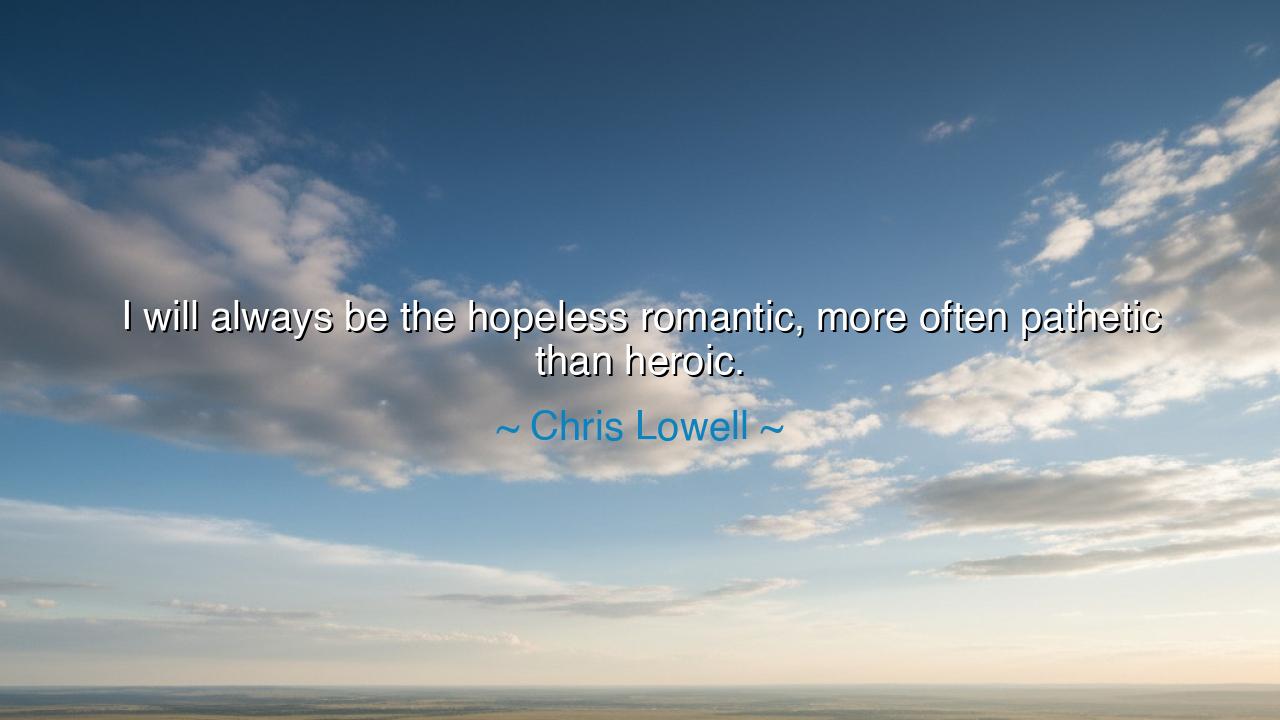
I will always be the hopeless romantic, more often pathetic than






Hear the confession of Chris Lowell, who once said: “I will always be the hopeless romantic, more often pathetic than heroic.” These words, simple yet profound, reveal the eternal struggle of those who love with unguarded hearts. To be a hopeless romantic is to walk through life with the soul unclothed, to dream of love as if it were destiny itself, even when reality strikes with its cruelties. Lowell speaks for all who dare to hope in love, even at the cost of dignity, even when their devotion makes them seem weak in the eyes of the world.
The hopeless romantic is one who refuses cynicism. While others hide behind armor, such a soul believes that love is worth the risk of rejection, that tenderness is worth the possibility of pain. Yet Lowell admits the cost: to live this way is to be more often pathetic than heroic. For great declarations of love may be met with silence, noble gestures may be mocked, and pure intentions may be misunderstood. The world often rewards the calculating and the cautious, not the ones who throw their hearts into the fire.
But there is a hidden heroism even in this so-called pathetic stance. Consider the life of Cyrano de Bergerac, the French poet and swordsman whose story became legend. He loved deeply, but from the shadows, believing himself unworthy of the woman he adored. His gestures of devotion seemed pathetic—letters written for another man, a love never confessed. Yet his suffering made his life a poem, his devotion a beacon of what it means to love selflessly. In his very vulnerability, there was greatness. So too with Lowell’s words: what appears pathetic is, in truth, the nobility of a heart unwilling to grow cold.
The origin of such sentiments is found in the very heart of Romantic tradition. The Romantics of the 18th and 19th centuries exalted passion above reason, feeling above calculation. To love hopelessly was not weakness but proof of the soul’s authenticity. The heroic warrior may win battles, but the hopeless romantic wins hearts—even if only in stories, even if only in memory. Lowell places himself in this lineage: a man who would rather risk being wounded by love than triumph without it.
Yet his confession carries a sobering honesty. To be “more often pathetic than heroic” is to admit that love rarely unfolds as in the tales. The hopeless romantic may endure heartbreaks, misunderstandings, and humiliations. They may be laughed at by those who see love as a game, not a calling. And still, they rise again, heart open, ready to love once more. This resilience, though clothed in apparent weakness, is in truth a profound strength. For it is far easier to close the heart than to keep it vulnerable.
The lesson for us is clear: do not be ashamed if your love makes you look pathetic in the eyes of others. The world may prize caution, but the soul thrives on passion. Better to love foolishly than to live without love at all. Yet also remember that love is not only longing—it requires patience, humility, and courage. The hopeless romantic must learn to temper their dreams with wisdom, to persist not in blind fantasy but in authentic devotion.
Therefore, children of tomorrow, embrace the spirit of the hopeless romantic, but do not despair when your love seems more pathetic than heroic. For every wound teaches you tenderness, every rejection strengthens your resolve, every heartbreak carves a space for deeper love. True heroism is not in conquering others, but in refusing to let the heart grow cold.
Thus, Chris Lowell’s words, spoken in humility, carry timeless wisdom: to love fully is to risk humiliation, but in that risk lies the greatest beauty of human life. To be hopelessly romantic is to be endlessly alive.






AAdministratorAdministrator
Welcome, honored guests. Please leave a comment, we will respond soon